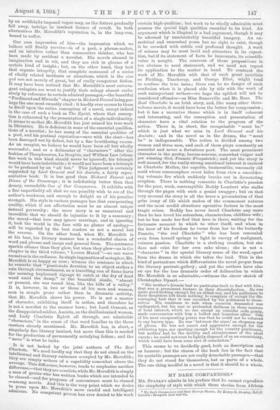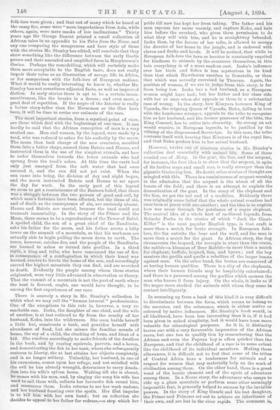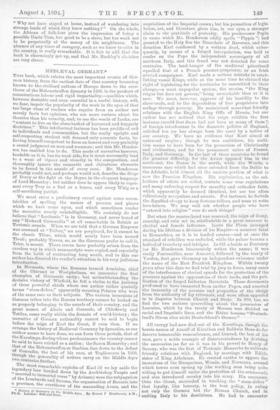MY DARK COMPANIONS.* Mn. STANLEY admits in his preface that
he cannot reproduce the simplicity of style with which these stories from African * 3fy Dark Companions and their Strange Stories. By Henry M. Stanley, D.0.04j London, Sampson Low and Co. folk-lore were given ; and that out of many which he heard at the camp fire, some were "mere importations from Asia, while others, again, were mere masks of low inclinations." Thirty years ago Sir George Dasent printed a small collection of African tales in an appendix to his Tales from he Norse, and any one comparing the meagreness and bare style of those with the stories Mr. Stanley has edited, will conclude that they show something like the difference between the early Gaelic poems and their amended and amplified form in Macpherson's Onion. Perhaps the remodelling, which will certainly make them more acceptable to the English taste, does not really impair their value as an illustration of savage life in Africa, or for comparison with the folk-lore of European nations. What it would be really interesting to know is, whether Mr. Stanley has not sometimes adjusted facts, as well as improved diction. In early stories there is apt to be a certain incon- secutiveness, like the breaks in a dream ; and even more, a good deal of repetition. If the negro of the Interior is really a better story-teller than the Norseman or the Slav have been, it will be time to revise our estimate of the race.
The most important stories, from a mystical point of view, are those which deal with the beginnings of our race. It can hardly be said that the African conception of man is a very exalted one. Man and woman, by the legend, were made by a toad, who was reduced to ashes for his audacity by the moon. The moon then took charge of the new creatures, moulded them into a better shape, named them Bateta and Hanna, and instructed them in the use of the simplest utensils, and how to order themselves towards the lower animals who had sprung from the toad's ashes. At this time the earth had only just emerged from the soft water that had once covered it, and the sun did not yet exist. When the sun came into being, the division of day and night began, and the moon instructed Bateta and Hanna to set apart the day for work. In the early part of this legend we seem to get a reminiscence of the Eastern belief, that there was a struggle between the two powers of good and evil, by which man's fortunes have been affected, but the ideas of sin, and of death as the consequence of sin, are curiously absent. Hanna and Bateta are mortal, because the toad could not transmit immortality. In the story of the Prince and the Moon, there seems to be a reproduction of the Tower of Babel. A spoiled child, the son of a great chief of the Bandimba, asks his father for the moon, and his father erects a lofty tower on the summit of a mountain, so that his workmen are actually able to begin pulling the moon down to earth. The tower, however, catches fire, and the people of the Bandimba are burned to ashes or turned into gorillas. In a third myth, a king and tribe, who have renounced the use of fire in consequence of a conflagration in which their kraal was burned, resolve to live in the home of the sun, and accordingly ascend the highest mountain they can find, and are scorched to death. Evidently the people among whom these stories originated, were very little advanced in observation or theory. That the summit of a mountain is not the part of earth where the heat is fiercest, ought, one would have thought, to be among the first experiences of our race.
There is scarcely a story in Mr. Stanley's collection in which what we may call the "human interest" predominates. One of the exceptions to this rule is, however, a very re- markable one. Izoka, the daughter of one chief, and the wife of another, is at last reduced to fly from the cruelty of her husband, Koku, into the wilderness. She soon builds herself a little hut, constructs a tank, and provides herself with abundance of food, but she misses the familiar sounds of home, the cry of a child, the clucking of hens, and bleat of a kid. She resolves accordingly to make friends of the dwellers in the bush, and by rearing squirrels, parrots, and a heron, and domesticating the fish in her tank, whom she subsequently restores to liberty, she at last attains her objects completely, and is no longer solitary. Unluckily, her husband, in one of his excursions, comes upon her refuge, and not satisfied with the evil he has already wrought, determines to carry desola- tion into his wife's sylvan home. Waiting till she is absent, he comes with his men, and, by singing the song his wife has used to call them with, collects her favourite fish round him, and massacres them. Izoka returns to see her work undone, and her husband feasting over the spoils. Her rist impulse is to kill him with her own hand ; but on reflection she decides to appeal to her father for redress,—a step which her pride till now has kept her from taking. The father and his men espouse her cause warmly, and capture Koku, and hale him before the overlord, who gives them permission to do what they will with him, and he is straightway beheaded. Izoka then, by the favour of her tribe, is allowed to occupy the district of her home in the jungle, and is endowed with slaves and flocks and herds. It will be noticed, that while in European folk-lore the hero or heroine is constantly requited for kindness to animals by the creatures themselves, in this tale everything is of a more modern cast. Izoka's influence over her birds and fishes is less mysterious in its kind than that which Hawthorne ascribes to Donatello, or than that which was actually exercised by Thoreau. Again, the position of women, if we are to judge from this story, is far from being low. Izoka has a bad husband, as a European woman might have had; but her father and her class side with her at once when she appeals to them in a substantial case of wrong. In the story, how Kimyars. becomes King of Uganda, the reigning Queen of Uganda, Naku, falling in love with the handsome stranger, appeals to the tribe to recognise him as her husband, and the former possessor of the title, the King Consort, has to retire into obscurity. So strong an act would require, in European legends, to be justified by the villainy of the dispossessed Sovereign. In this case, the tribe contents itself with hearing that Kimyara is of the royal line, and that Naku prefers him to her actual husband.
However, twelve out of nineteen stories in Mr. Stanley's collection deal essentially with animal life. Some of these remind one of Esop. In the goat, the lion, and the serpent, for instance, the first idea is to show that the serpent, in spite of its furtive ways and small size, is really stronger than the gigantic blustering lion. No doubt other strains of thought are mingled with this. There is a reminiscence of serpent-worship in the admission that the serpent is the wisest of all the beasts of the field ; and there is an attempt to explain the domestication of the goat. In the story of the elephant and the lion, we get the tail end of a tradition. Evidently there was originally some belief that the whole animal creation had once been at peace with one another ; and the idea is to explaiu bow war arose through the petulance of a rogue elephant. The central idea of a whole host of media3val legends, from Reineke Fuchs to the stories of which "Jack the Giant. Killer" is the most popular English type, is that craft is more than a match for brute strength. In European folk- lore, the fox outwits the bear and the wolf, and the man is more than a match for the giant. In African story, the dog circumvents the leopard, the terrapin is wiser than the crane, the rabbit—a kinsman of Brer Rabbit—is more than a match for elephant, buffalo, leopard, lion, and hyena ; and the boy masters the gorilla and quells a rebellion of the larger beasts against man. On the other hand, the brutes are conceived of as having human qualities. There is a city of the elephants, where their human friends may be hospitably entertained ; and there is a password among the gorillas which secures the man who knows it from injury. On the whole, it looks as if the negro races studied the animals with whom they come in contact intelligently.
In summing up from a book of this kind it is very difficult to discriminate between the form, which seems to belong to the narrator, and the substance, which is either native or coloured by native influences. Mr. Stanley's book would, in all likelihood, have been less interesting than it is, if it had been .given in naked simplicity, but it would have been more valuable for ethnological purposes. As it is, it distinctly leaves one with a very favourable impression of the African races, but one has to qualify this by remembering that the African and even the Papuan boy is often quicker than the European, and that the childhood of a race is to some extent like the childhood of its individual members. Making these allowances, it is difficult not to feel that some of the tribes of Central Africa have a tenderness for animals and a respect for women that may materially help on the work of civilisation among them. On the other hand, there is a great want of the heroic element and of the spirit of adventure among them. In a Norse story, the adventurer who essays to ride up a glass mountain or perform some other seemingly impossible feat, is generally helped to success by the invisible powers. In the story of King Gumbi and his lost daughter, the Prince and Princess set out to achieve an inheritance of their own, and are lost in the river rapids. The comment is, "Why not have stayed at home, instead of wandering into strange lands of which they knew nothing P " On the whole, the African of folk-lore gives the impression of being a possible Uncle Tom, too good to be a slave, but too weak not to be perpetually at the mercy of his neighbours. The absence of any trace of savagery, such as we know to exist in the country, is really remarkable. It is fair to add that the book is charmingly got up, and that Mr. Buckley's sketches are very clever.




































 Previous page
Previous page